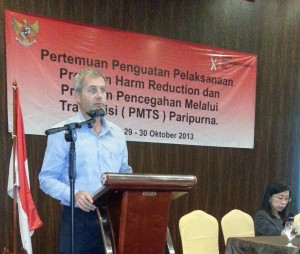A key high risk group for the HIV/AIDS epidemic in Indonesia has been identified as urban males, blue collar workers, who buy sex services from female sex workers (FSWs). A major study by Rapid Asia found that the main problem was not primarily due to lack of general knowledge of HIV or why condoms should be used, but the existence of other, preventative actions which simply are not effective but give HRM and FSWs a sense of false comfort. The strategy in Indonesia has focused on the supply side with an attempt to push condoms through distribution to become accessible to FSWs. This has been complimented with peer education and capacity development for condom negotiation skills to encourage usage. Despite the existence of radical groups who equate condoms with promoting promiscuity and prostitution, condoms have been made available through the existing supply network. But focusing on the supply side is not enough, there must also be focus on the demand side, targeting HRM who don’t use condoms consistently.

